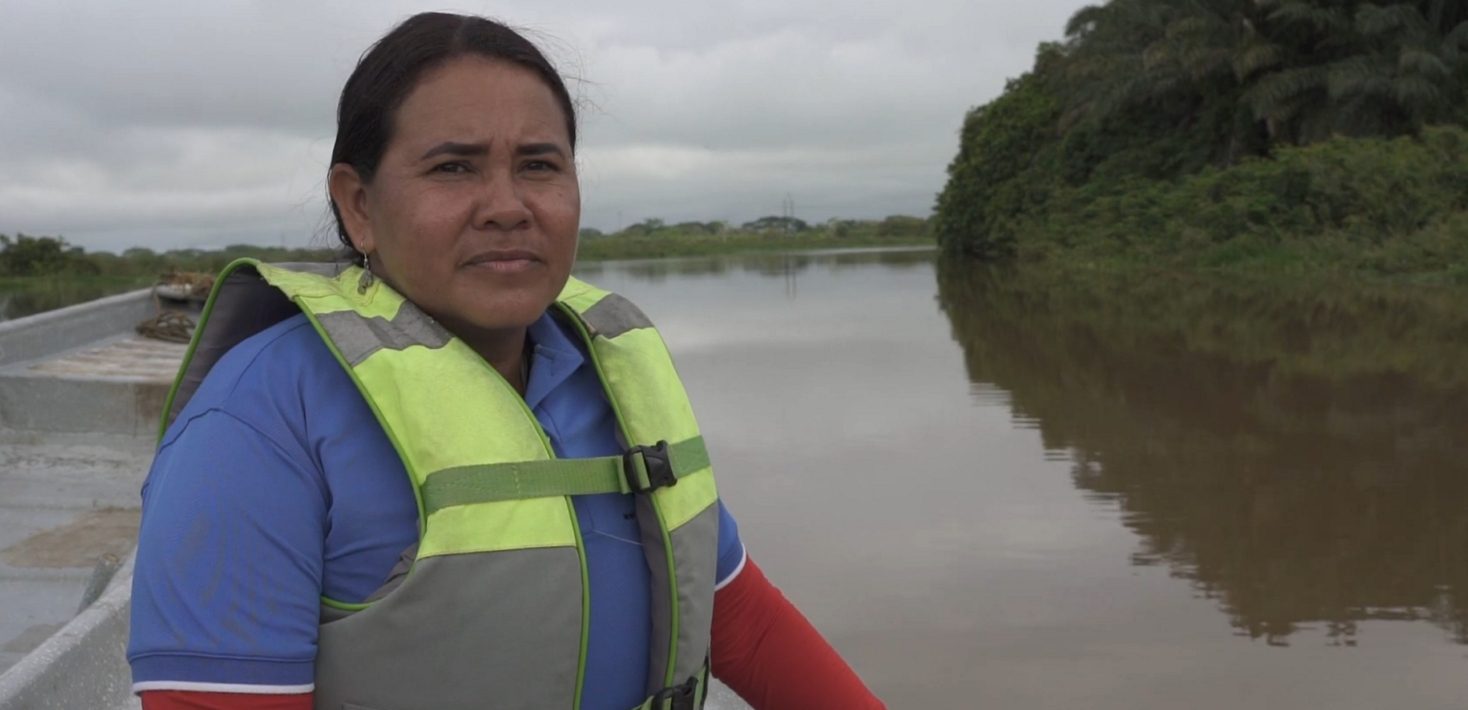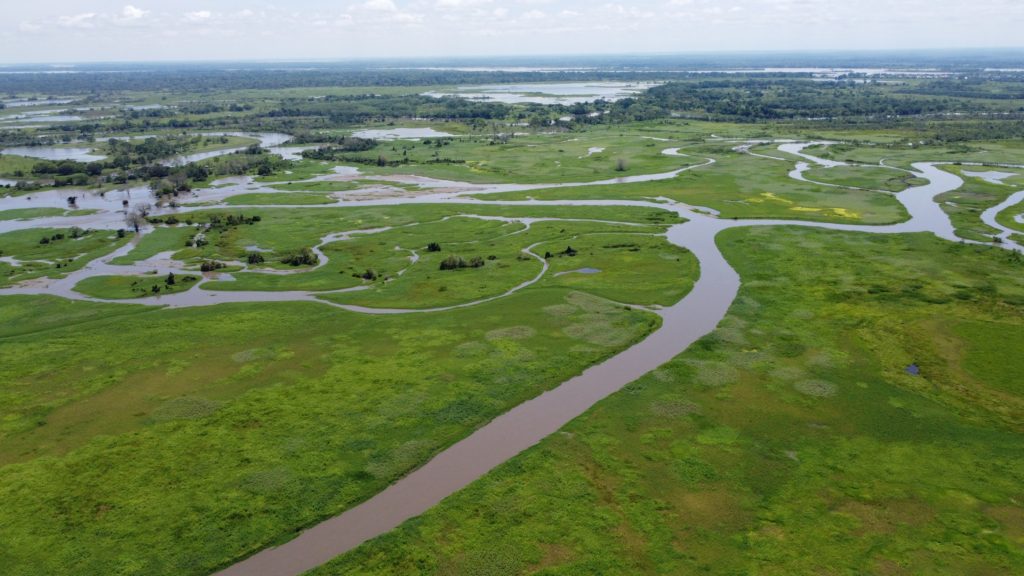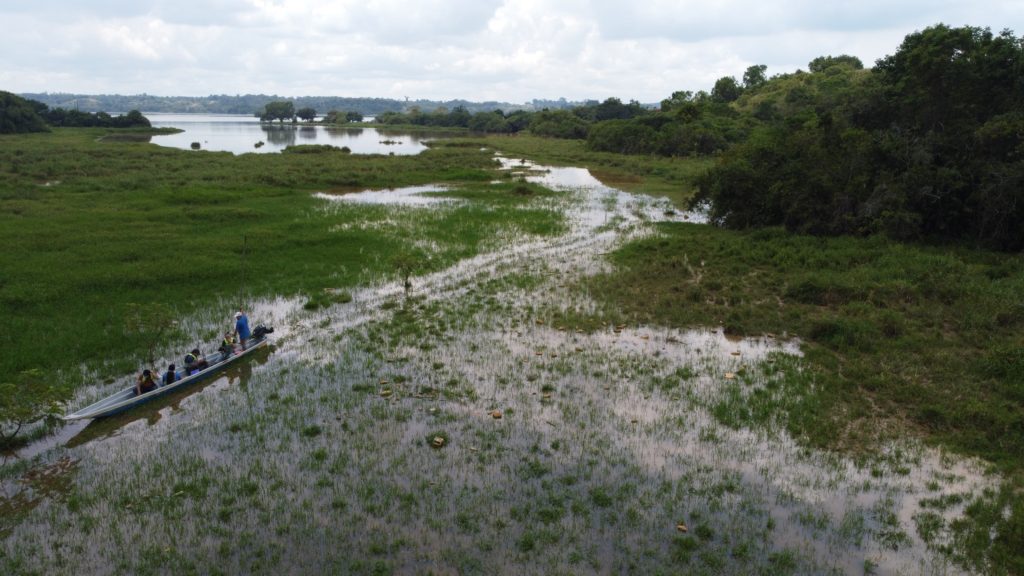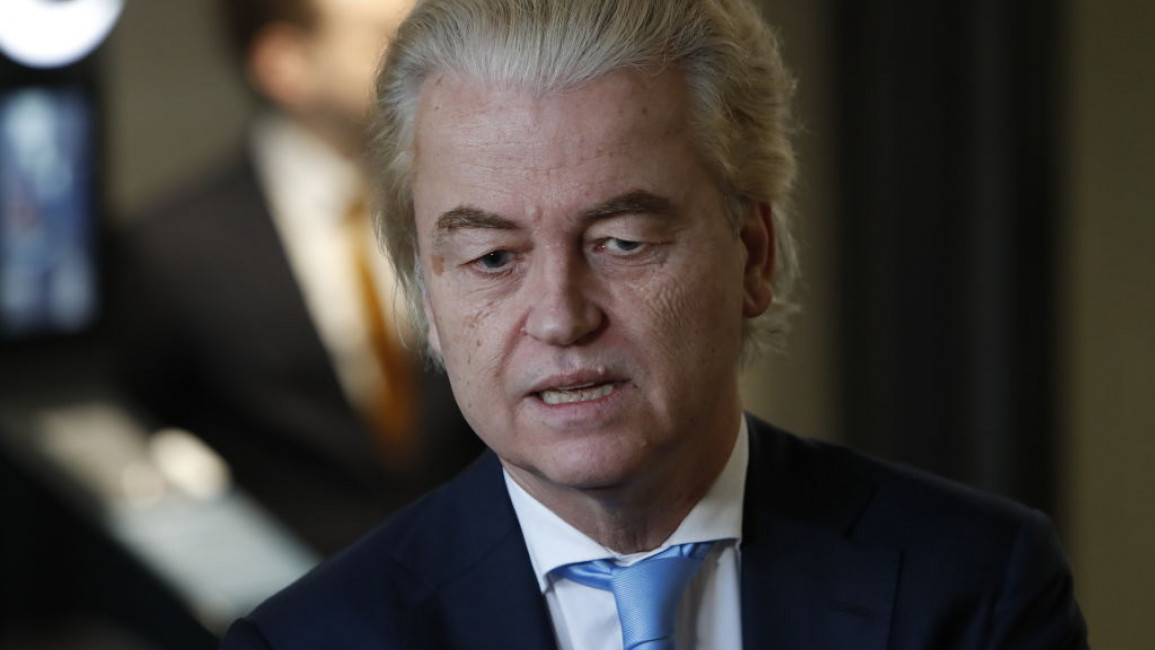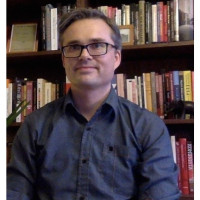A Tortured and Deadly Legacy: Kissinger and Realpolitik in US Foreign Policy
Henry Kissinger, who died on Nov. 29, 2023, at age 100
DECEMBER 1, 2023
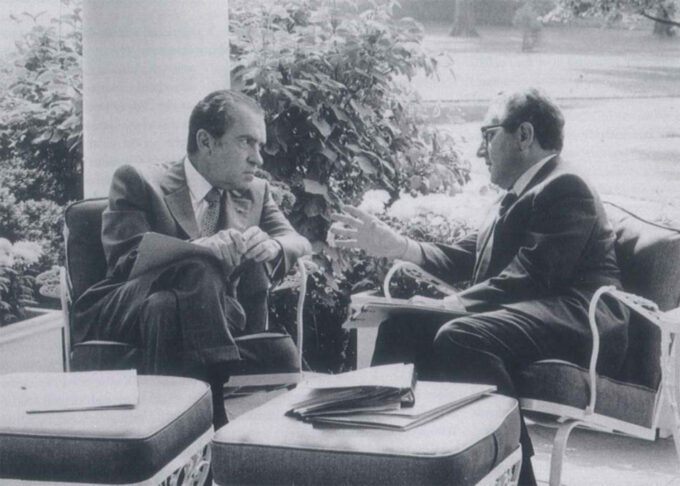
I am a scholar of American foreign policy who has written on Kissinger’s service from 1969 to 1977 as national security adviser and secretary of state under the Nixon and Ford administrations. I have seen how his foreign policy views and actions played out for good and, mostly, for ill.
When Kissinger entered government as Richard Nixon’s national security adviser, he espoused a narrow perspective of the national interest, known as “realpolitik,” primarily centered on maximizing the economic and military power of the United States.
This power- and transactionalist-oriented approach to foreign policy produced a series of destructive outcomes. They ranged from fomenting coups that put in place murderous dictatorships, as in Chile, to killing unarmed civilians, as in Cambodia, and alienating potential allies, as in India.
Damaging approach
In his dissertation turned first book, Kissinger argued foreign policymakers are measured by their ability to recognize shifts in political, military and economic power in the international system – and then to make those changes work in their country’s favor.
In this model of foreign policy, the political values – democracy, human rights – that make the United States a distinctive player in the international system have no role.
This perspective, with its self-declared realistic agenda, along with Kissinger’s place at the top of the foreign policy establishment as national security adviser and secretary of state for the better part of a decade, made Kissinger into something of a foreign policy oracle for American policymakers of all stripes.
Yet Kissinger’s record reveals the problems with the narrow conception of national interest devoid of values. His time in government was characterized by major policy decisions that were generally detrimental to the United States’ standing in the world.
Cambodian carnage
When Nixon took office in 1968, he had promised an honorable end to the war in Vietnam.
Nixon faced a problem, however, in trying to gain control of the conflict: the porousness of Vietnam’s borders with Cambodia, through which supplies and soldiers from North Vietnam flowed into the South.
To address this problem, Nixon dramatically escalated a bombing campaign in Cambodia started under his predecessor, President Lyndon Johnson. Nixon later initiated a ground invasion of Cambodia to cut off North Vietnamese supply routes.
As William Shawcross details in his defining book on the subject, Kissinger supported Nixon’s Cambodia policy.
Despite the fact that Cambodia was not party to the conflict fought in Vietnam, U.S. bombing of Cambodia is estimated to have exceeded the total tonnage of all the bombs dropped by the U.S. during World War II, including the nuclear bombs at Hiroshima and Nagasaki.
The campaign killed tens of thousands of Cambodians and displaced millions. The destruction caused by the bombing as well as partial American occupation in 1970 were crucial to creating the political and social instability that facilitated the rise of the genocidal Khmer Rouge regime. That regime is estimated to have killed 2 million Cambodians.
Supporting a genocidal leader
In 1970 and 1971, Nixon, with Kissinger’s advice and encouragement, supported Pakistan’s dictatorial president Yahya Khan in his genocidal repression of Bengali nationalists and war against India.
That conflict is estimated to have killed at least 300,000 and possibly more than a million Bengalis. Khan targeted for complete elimination the Hindus in what would become Bangladesh.
In frustration at pressure from India over the subsequent refugee crisis, Kissinger agreed with Nixon that India – a fellow democracy bearing the burden of millions of refugees from East Pakistan — needed a “mass famine” to put the country in its place.
The duo went so far as to send an aircraft carrier battle group to threaten India after it suffered a series of cross-border attacks by Pakistan.
Nixon and Kissinger’s policy in support of Pakistan during a period of unvarnished brutality and aggression played a significant role in pushing India toward an alignment with the Soviet Union. Nixon and Kissinger injected distrust of the United States into the foundations of Indian foreign policy, dividing the world’s oldest and largest democracies for decades.
Exploiting Kurds, empowering Saddam
In 1972, Kissinger agreed to a request from the Shah of Iran to provide military aid to Kurds in Iraq who were seeking an independent homeland. Iran’s goal was to put pressure on the Iraqi regime controlled by Saddam Hussein, while Kissinger sought to keep the Soviets out of the region. The scheme was predicated on the Kurds’ belief that the United States supported Kurdish independence, a point the Shah noted. But the U.S. abandoned the Kurds on the eve of an Iraqi offensive in 1975, and Kissinger coldly noted that “covert action should not be confused with missionary work.”
Ultimately, the Iraqi defeat of the Kurds would empower Hussein, who would go on to destabilize the region, kill hundreds of thousands of people and fight unprovoked wars with Iran and the United States.
‘Amoral vision’
After Kissinger left government service in 1977, he founded Kissinger Associates, a geopolitical consulting firm. Publicly, Kissinger consistently advised U.S. policymakers to bend U.S. policy to accommodate the interests and actions of important foreign powers like Russia and China.
These positions were consistent with Kissinger’s demonstrated willingness to trade away rights of others to gain advantage for the U.S. His positions also presumably enabled Kissinger Associates to maintain access with the foreign policy elites of those countries.
In May 2022, Kissinger publicly argued that Ukraine, a victim of unprovoked aggression by Russia, should cede portions of its internationally recognized territory seized by Russia – as in Crimea – or by Russian proxies such as the Donetsk People’s Republic.
Kissinger also maintained that the United States should accommodate China, arguing against a concerted effort by democracies to counter the rising power and influence of China.
Foreign policy is a difficult field, fraught with complexity and unanticipated consequences. Kissinger’s vision, however, does not offer a panacea to the challenge of American foreign policy.
Over decades, Kissinger’s amoral vision of national self-interest has produced its own set of disasters, a reality the American public and foreign policy leaders are well-advised to bear in mind.
This article is republished from The Conversation under a Creative Commons license. Read the original article.
Henry Kissinger: Snake Oil Salesman of Gangster Realism
“‘He’ll have ye smilin’,” an old Irish saying goes, “while he takes the gold out of your teeth’.”
— Charles Glass, London Review of Books, Oct 20, 2022
The obituaries of criminals, masterful or otherwise, are always going to be sordid matters. Either one has time for the deeds, giving column space to their execution and legacy, or one focuses on the extraneous details: voice, accent, suit, demeanour. “He may have killed the odd person or two, but he did have style.”
Much of the Henry Kissinger School of Idolatry is of the latter propensity. The nasty deeds are either misread or diminished – notably when they have to do with the global infliction of mass death, prolongation of conflict, or the overthrow of democratic governments. Instead, time is given to the perceptions of what is supposedly meant to have been the workings of an oversized brain in international relations. Rather than seeing the inside of a prison or being bothered to the gallows by overly fussy lawyers, Kissinger spent ample time at high level receptions receiving huge wads of cash for offering his inner expertise. He was admired, adulated and pampered; the critics kept at bay.
As former National Security Advisor and US Secretary of State, he was meant to be the great exponent of realism, which, rebadged, might simply be described as elevated gangsterism at play. His 1957 work, A World Restored: Metternich, Castlereagh and the Problems of Peace 1812-1822 studied the Europe of the admired diplomat Prince Clemens von Metternich, revealing a mind keen on keeping international power in fine equilibrium. Stability and order were primary goals; justice and human rights were concepts that had little to no role to play.
Metternich, alongside British Foreign Secretary, Viscount Robert Stewart Castlereagh, was to construct a post-Napoleonic order suspicious, even paranoid, of revolutionary movements. It held social and political progress in check; doused the fires of freedom. As a result, Kissinger reasons, Europe maintained stability from Napoleon’s defeat in 1815 to the outbreak of the First World War in August 1914. For all that, Kissinger would write that Metternich lacked “the ability to contemplate an abyss, not with the detachment of a scientist, but as a challenge to overcome – or perish in the process.” As if envisaging his own future role in US diplomacy, he suggested that “men become myths, not by what they know, nor even by what they achieve, but the tasks they set themselves.”
This gnomic drivel was precisely the sort that fed a media illusion of the big-brained sage in command. His bloodied hands were washed on the international stage by such absurd titles as “Henry of Arabia,” one given to him by Time Magazine in 1974. The same magazine would give him front-cover billing in February 1969 as one keen on “New Approaches to Friends and Foes”, and repeat the treatment on no fewer than fourteen other occasions. Not to be outdone, Newsweek was positively crawling in depicting the German-Jewish émigré who made his name at Harvard and on the world stage as “Super K”.
As the Establishment Courtesan, Kissinger sought out such society reporters as Sally Quinn of The Washington Post to emetically inquire why she did not assume the master strategist to be “a secret swinger”. Sadistic touches to his curriculum vitae could thereby be ignored, including a butcher’s bill that would eventually run into roughly 3 million souls from the Vietnam War to Cambodia, East Timor, Bangladesh, the “dirty wars” of Latin America, and a number of encouragements and interventions in Africa.
This also meant that abysmal contributions such as his spoiling role in prolonging the war in Vietnam by several years in order to satisfy the electoral lust of his eventual boss, Richard Nixon, could be overlooked in favour of “shuttle diplomacy ” in ending the Arab-Israeli War of October 1973. In this, he resembled, as Charles Glass suggested with striking salience, a certain “American frontier archetype: the peddler whose wagonload of patent medicines promised to cure every ailment. By the time the rubes realised that his bottles contained snake oil, he had left town.”
A far better appreciation of the Kissinger legacy would be gained by consulting such publications as that ever reliable, if bleak source of primary documents, the National Security Archive. The Archive pursued the US government with admirable tenacity, alleging that Kissinger had sought to remove, retain and control some 30,000 pages of daily transcripts of his phone conversations (“telcons”) as “personal papers” when he left office in 1977.
As the director of the Archive, Tom Blanton, piquantly remarked, “Kissinger’s aides later commented that he needed to keep track of which lie he told to whom.” But the telcons are also illustrative, less of Kissinger the realist who furnished his employer with fearless advice than that of a truckler, obedient to his paymaster. When Nixon made the decision to commence the secret bombing of Cambodia to target Hanoi’s supply routes in March 1969, Kissinger conveyed the order to Secretary of Defence Melvin Laird without demur. He also states firmly that “there is to be no public comment at all from anyone at any level either complaining or threatening”. When public comment did make its way to the New York Times in May that year, Kissinger badgered the FBI Director J. Edgar Hoover to place a number of selected government officials and journalists under surveillance.
While one’s death is rarely a planned thing – the Grim Reaper makes calls at all unexpected hours – there was a sense in Kissinger’s case that he had cheated it just long enough. He made it to a century without his collar being fingered. He avoided, in the early 2000s, attempted legal suits for human rights violations in the UK and France. Despite failing health, he was surrounded by the Establishment sycophants of which he had been one, worshipping power over principle while proffering snake oil. And there were a goodly number of them for the sendoff.
Binoy Kampmark was a Commonwealth Scholar at Selwyn College, Cambridge. He lectures at RMIT University, Melbourne. Email: bkampmark@gmail.com. Read other articles by Binoy.
November 30, 2023
By Harry Miller
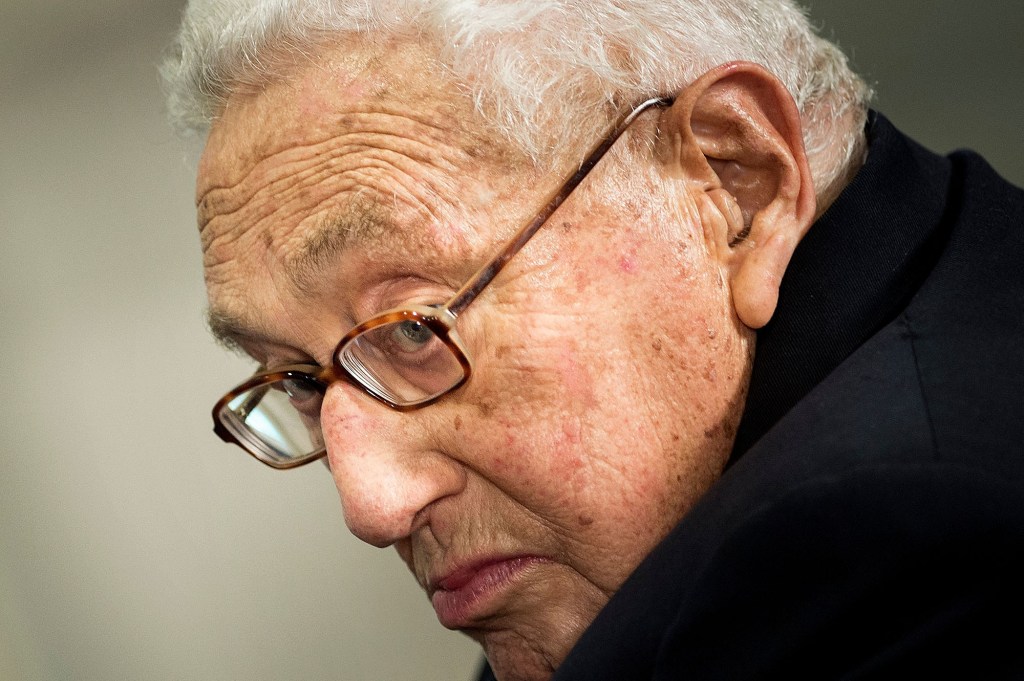
Henry Kissinger died on Wednesday at his home in Connecticut, his consulting firm said in a statement. The notorious war criminal was 100.
Measuring purely by confirmed kills, the worst mass murderer ever executed by the United States was the white-supremacist terrorist Timothy McVeigh. On April 19, 1995, McVeigh detonated a massive bomb at the Murrah federal building in Oklahoma City, killing 168 people, including 19 children. The government killed McVeigh by lethal injection in June 2001. Whatever hesitation a state execution provokes, even over a man such as McVeigh — necessary questions about the legitimacy of killing even an unrepentant soldier of white supremacy — his death provided a measure of closure to the mother of one of his victims. “It’s a period at the end of a sentence,” said Kathleen Treanor, whose four-year-old McVeigh killed.
McVeigh, who in his own psychotic way thought he was saving America, never remotely killed on the scale of Kissinger, the most revered American grand strategist of the second half of the 20th century.
The Yale University historian Greg Grandin, author of the biography Kissinger’s Shadow, estimates that Kissinger’s actions from 1969 through 1976, a period of eight brief years when Kissinger made Richard Nixon’s and then Gerald Ford’s foreign policy as national security adviser and secretary of state, meant the end of between three and four million people. That includes “crimes of commission,” he explained, as in Cambodia and Chile, and omission, like greenlighting Indonesia’s bloodshed in East Timor; Pakistan’s bloodshed in Bangladesh; and the inauguration of an American tradition of using and then abandoning the Kurds.
“The Cubans say there is no evil that lasts a hundred years, and Kissinger is making a run to prove them wrong,” Grandin told Rolling Stone not long before Kissinger died. “There is no doubt he’ll be hailed as a geopolitical grand strategist, even though he bungled most crises, leading to escalation. He’ll get credit for opening China, but that was De Gaulle’s original idea and initiative. He’ll be praised for detente, and that was a success, but he undermined his own legacy by aligning with the neocons. And of course, he’ll get off scot free from Watergate, even though his obsession with Daniel Ellsberg really drove the crime.”
No infamy will find Kissinger on a day like today. Instead, in a demonstration of why he was able to kill so many people and get away with it, the day of his passage will be a solemn one in Congress and — shamefully, since Kissinger had reporters like CBS’ Marvin Kalb and The New York Times‘ Hendrick Smith wiretapped — newsrooms. Kissinger, a refugee from the Nazis who became a pedigreed member of the “Eastern Establishment” Nixon hated, was a practitioner of American greatness, and so the press lionized him as the cold-blooded genius who restored America’s prestige from the agony of Vietnam.
Not once in the half-century that followed Kissinger’s departure from power did the millions the United States killed matter for his reputation, except to confirm a ruthlessness that pundits occasionally find thrilling. America, like every empire, champions its state murderers. The only time I was ever in the same room as Henry Kissinger was at a 2015 national security conference at West Point. He was surrounded by fawning Army officers and ex-officials basking in the presence of a statesman.
Seymour Hersh, the investigative reporter who was the most prominent exception to the fawning coverage of Kissinger, watched journalistic deference take shape as soon as Kissinger entered the White House in 1969. “His social comings and goings could make or break a Washington party,” Hersh wrote in his biography The Price of Power. Reporters like the Times’ James Reston were eager participants in what Hersh called “an implicit shakedown scheme” — that is, access journalism — “in which reporters who got inside information in turn protected Kissinger by not divulging either the full consequences of his acts or his own connection to them.” Kissinger’s approach to the press was his approach to Nixon: sniveling obsequiousness. (Although Kissinger could vent frustration on reporters that he never could on his boss.) Hersh quotes H.R. Haldeman, Nixon’s chief of staff, remarking that Kissinger was the “hawk of hawks” inside the White House, but “touching glasses at a party with his liberal friends, the belligerent Kissinger would suddenly become a dove.”
Reviewing one of Kissinger’s litany of books, Hillary Clinton in 2014 said Kissinger, “a friend” whose counsel she relied upon as secretary of state, possessed “a conviction that we, and President Obama, share: a belief in the indispensability of continued American leadership in service of a just and liberal order.” Kissinger told USA Today within days that Clinton, presumed then to be a president-in-waiting, “ran the State Department in the most effective way that I’ve ever seen.” The same story noticed a photograph autographed by Obama thanking Kissinger for his “continued leadership.”
It’s always valuable to hear the reverent tones with which American elites speak of their monsters. When the Kissingers of the world pass, their humanity, their purpose, their sacrifices are foremost in the minds of the respectable. American elites recoiled in disgust when Iranians in great numbers took to the streets to honor one of their monsters, Qassem Soleimani, after a U.S. drone strike executed the Iranian external security chief in January 2020. Soleimani, whom the United States declared to be a terrorist and killed as such, killed far more people than Timothy McVeigh. But even if we attribute to him all the deaths in the Syrian Civil War, never in Soleimani’s wildest dreams could he kill as many people as Henry Kissinger. Nor did Soleimani get to date Jill St. John, who played Bond girl Tiffany Case in Diamonds Are Forever.
KISSINGER’S ASCENT OCCURRED THROUGH AN OBSCENITY THAT TIME CANNOT DIMINISH. In 1968, Lyndon Johnson agreed to peace negotiations with the North Vietnamese in tacit recognition of the nightmare he, building on the works of his two immediate predecessors, brought to life in Vietnam. Kissinger, an influential Cold War defense intellectual at Harvard, had access to members of the diplomatic delegation to the Paris talks. He used it to feed information from the negotiations to Richard Nixon’s presidential campaign — a campaign whose defeated GOP rival, Nelson Rockefeller, Kissinger advised — and despite Kissinger’s closer political ties to the coterie around Hubert Humphrey, Nixon’s Democratic rival.
Nixon ran for president claiming to have a secret plan to end the war. His advisers told Hersh they were deeply afraid that Johnson and Hanoi would reach an accord before the election. It would save lives in Vietnam, American and Vietnamese, but it would undermine Nixon’s hopes of exploiting the explosion in domestic antiwar sentiment. Nixon gratefully took what Kissinger gave him to make the U.S.’ proxy regime in Saigon, whose regime peace would destabilize, more intransigent. No agreement was reached until 1973, and the war ended in American humiliation with Hanoi’s 1975 victory.
“It took some balls to give us those tips,” Richard Allen, a foreign policy researcher on the Nixon campaign, later reflected to Hersh. After all, it was “a pretty dangerous thing for [Kissinger] to be screwing around with the national security.”
Every single person who died in Vietnam between autumn 1968 and the Fall of Saigon — and all who died in Laos and Cambodia, where Nixon and Kissinger secretly expanded the war within months of taking office, as well as all who died in the aftermath, like the Cambodian genocide their destabilization set into motion — died because of Henry Kissinger. We will never know what might have been, the question Kissinger’s apologists, and those in the U.S. foreign policy elite who imagine themselves standing in Kissinger’s shoes, insist upon when explaining away his crimes. We can only know what actually happened. What actually happened was that Kissinger materially sabotaged the only chance for an end to the war in 1968 as a hedged bet to ensure he would achieve power in Nixon’s administration or Humphrey’s. A true tally will probably never be known of everyone who died so Kissinger could be national security adviser.
Once in the White House, Nixon and Kissinger found themselves without leverage to produce a peace accord with Hanoi. In the hopes of manufacturing one, they came up with the “Madman Theory,” the idea that North Vietnam would negotiate peace after they came to believe Nixon was adventurous and bloodthirsty enough to risk anything. In February 1969, weeks after taking office, and lasting through April 1970, U.S. warplanes secretly dropped 110,000 tons of bombs on Cambodia. By the summer of 1969, according to a colonel on the Joint Staff, Kissinger — who had no constitutional role in the military chain of command — was personally selecting bombing targets. “Not only was Henry carefully screening the raids, he was reading the raw intelligence,” Col. Ray B. Sitton told Hersh for The Price of Power. A second phase of bombing continued until August 1973, five months after the final U.S. combat troops withdrew from Vietnam. By then, U.S. bombs had killed an estimated 100,000 people out of a population of only 7,000,000. The final phase of the bombing, which occurred after the Paris Peace Accords mandated U.S. withdrawal from Vietnam, was its most intense, an act of cruel vengeance from a thwarted superpower.
Cambodia, like Laos before it, was a formally neutral country, meaning that bombing it was an illegal aggression under the United Nations Charter. But beyond the control of Prince Sihanouk, the North Vietnamese used Cambodian territory for the Ho Chi Minh Trail, a weapons pipeline not unlike the one America is currently operating for Ukraine. In April 1970, following a coup by American client Col. Lon Nol that overthrew Sihanouk, Nixon ordered U.S. troops in Vietnam to invade Cambodia outright. In the air or on the ground, they were unable to destroy the trail, only human beings. Those who survived reacted. “Sometimes the bombs fell and hit the little children, and their fathers would be all for the Khmer Rouge,” a former Khmer Rouge cadre told historian Ben Kiernan, founder of Yale University’s Genocide Studies Program.
Nixon and Kissinger’s failure in Cambodia prompted in 1971 the U.S.-South Vietnamese invasion of Laos, another failure. Kissinger later blamed defeat on the U.S.’ clients, rather than, say, people like himself. “In retrospect, I have come to doubt whether the South Vietnamese ever really understood what we were trying to accomplish,” Kissinger wrote in his memoirs.
At the time, the secret bombing of Cambodia was a startling offense that prompted substantial political backlash when it became public. One of the articles of impeachment against Nixon prepared by the House Judiciary Committee in 1974 held that bombing Cambodia was a constitutional usurpation of Congress’ war powers. But on July 30, the committee ended up rejecting the article, 26 votes to 12, and it never became part of the coalescing impeachment effort that stopped with Nixon’s resignation.
Forty years later, and likely as a consequence, U.S. presidents routinely bomb countries the U.S. is not at war with. They provide the barest minimum of disclosure that the bombs have fallen, and often not even that. When the U.S.’ declared wars fail, as they did in Iraq and Afghanistan, their architects and stewards blame the client militaries and governments they propped up. They cover their troop withdrawals with futile bombing campaigns that kill people so American statesmen can save face. Whether he realized it or not, when President Biden in July 2021 blamed the Afghans for losing the Afghanistan war — “the Afghan military collapsed, sometimes without trying to fight” was a typical line — he was reaching for Nixon and Kissinger’s template.
KISSINGER PLAYED A ROLE IN THE DEATHS OF SO MANY DIFFERENT PEOPLES that treating each with due consideration requires writing a book. Here is one example among many of the sort of carnage Kissinger inflicted indirectly rather than by edict. In 1971, the Pakistani government waged a campaign of genocide to suppress the independence movement in what would become Bangladesh. Pakistan’s Yahya Khan, an architect of the genocide, was valuable to Nixon’s ambitions of restoring diplomatic relations with China. So the U.S. let Khan’s forces rape and murder at least 300,000 people — and perhaps three million. “We can’t allow a friend of ours and China’s to get screwed in a conflict with a friend of India’s,” Nixon quoted Kissinger shrugging.
That perspective typified Kissinger. The Cold War was a geopolitical balance among two great powers. The purpose of Cold War statecraft was to maximize American freedom of action to inflict Washington’s will on the world — a zero-sum contest that meant restricting the ability of the Soviet Union to inflict Moscow’s — without the destabilization, or outright armageddon, that would result from pursuing a final defeat of the Soviets. That last part explains much right-wing hostility toward Kissinger. Kissinger represented anticommunism without ideological zeal. He was an energetic, even relentless practitioner of the Cold War, the theater of anticommunist conflict. But like George Kennan before him, Kissinger thought viewing the Cold War in ideological terms missed the point. The point was American geopolitical dominance, something measured in impunity and achieved by any means necessary. That permitted Nixon and Kissinger the creativity to reopen China, something Nixon would have demagogued anyone else for attempting.
Reopening China was by far the greatest achievement of Nixon’s foreign policy. It was the rare geopolitical initiative where Kissinger was a mere facilitator. Sy Hersh, in The Price of Power, calls Nixon “the grand theoretician” of rapprochement with Beijing, with Kissinger Nixon’s “occasional operative.” Kissinger’s dramatic, secret July 1971 trip to Beijing in advance of Nixon’s visit probably renders that description parsimonious. But, writes Hersh, “there is no evidence that Kissinger seriously considered the question of an American-Chinese rapprochement before his appointment as Nixon’s national security adviser.” Once it happened, Kissinger became an overnight celebrity, the sort of person destined to be shrouded in myth and apology.

President Richard Nixon and Secretary of State Henry Kissinger confer aboard Air Force One.
BETTMANN ARCHIVE/GETTY IMAGES
Kissinger might not have been motivated by hatred of communism. But he was a reactionary who empowered and enabled the sort of reactionaries for whom anticommunism was a respectable channel for America’s racist and exploitative socio-economic traditions. His chief aide on the National Security Council was a rabid anticommunist militarist, Army Col. Alexander Haig, a future secretary of state for Ronald Reagan. When Kissinger came under attack from neoconservatives and others on the right who couldn’t tolerate detente with the Soviets and rapprochement with the Chinese, neither he nor they recognized that both of them were driven by the Cold War forces that Kissinger stoked when convenient.
Most important of all the reactionaries was Nixon, without whom Kissinger would have lacked power, and from whom Kissinger would withstand any indignity.
Nixon was one of the original Cold War demagogues, the men who never hesitated to identify communism with Black people and the “Eastern Establishment” liberals who postured as allies. His escalation in Vietnam, along with the secret bombing in Cambodia he revealed in a televised address, prompted a resurgence of the antiwar movement. Nixon exploited the mass protests by contrasting them with the “silent majority” of loyal Americans. Instead of ending the war, as he had campaigned on doing, and silencing or co-opting the antiwar movement in the process, Nixon inflamed a culture war to distract from it. It was an echo of his infamous “Southern Strategy” to harness for the Republican Party the electoral benefits of white backlash to the civil rights movement.
Nixon was not subtle about who he meant by the Eastern Establishment. When the media seized upon the U.S. massacre at My Lai, Nixon remarked, “It’s those dirty rotten Jews from New York who are behind it.” Nixon’s White House counsel, John Erlichman, recalled Nixon talking about “Jewish traitors” in front of Kissinger, including “Jews at Harvard.” Kissinger would assure the boss he was one of the good ones. “Well, Mr. President,” Erlichman quoted him responding, “there are Jews and Jews.”
Kissinger maintained his standing in part by savaging the Eastern Establishment from which he emerged. It was not entirely cynical. Kissinger shared with Nixon a contempt for the “defeatism” and “pessimism” of those who flinched at the unsavory Vietnam War they once supported. He rationalized his purges of the National Security Council bureaucracy and his marginalization of the State Department — measures that made him indispensable to foreign policy, and to Nixon — as protecting American power from those who lacked the confidence to wield it. It is revealing that among those who make U.S. foreign policy, Kissinger’s perspective is not considered ideological.
Kissinger’s consolidation of bureaucratic control was punitive and paranoid. He used the fear of internal leaks to get the FBI to wiretap his staff and the journalists he suspected of receiving their information. Yet the Eastern Establishmentarians around Kissinger, on his staff or in the press, followed him like a puppy seeking an ear scratch. His coldblooded American exceptionalism was the perfect tone for speaking to a shaken ruling class. Anthony Lake, who would go on to become national security adviser to Bill Clinton, finally quit in May 1970, alongside his colleague Roger Morris. Their breaking points were the Vietnam escalation, Nixon’s alcoholism, and the surreptitious White House wiretaps that Nixon also pursued to enforce loyalty. But Lake and Morris opted not to go public. “I consider the failure to do so to be the biggest failure of my life,” Morris told Hersh for The Price of Power. “We didn’t do so on the single calculation that it would destroy Henry.” Weeks later, Kissinger, via Haig, had the FBI wiretap Lake.
IN SOUTHEAST ASIA, KISSINGER DESTROYED. But in Chile, he helped build a template for the world in which we currently live.
On September 4, 1970, Chileans elected the democratic socialist Salvador Allende president. Allende’s program was more than redistributionist. It demanded reparation from the U.S. for exploiting it. Chile is rich in copper, and by the mid-1960s, 80 percent of its copper production was controlled by American corporations, particularly the firms Anaconda Copper and Kennecott. When Allende nationalized mining assets held by the two companies, Allende informed them he would deduct estimated “excess profit” from a compensatory package he was willing to pay the firms. It was this sort of unacceptable policy that prompted Kissinger to remark, during an intelligence meeting about two months before Allende’s election, “I don’t see why we need to stand idly by and watch a country go communist due to the irresponsibility of its own people.”

Protesters shout “Arrest Henry Kissinger for war crimes” as Former U.S. Secretary of State Henry Kissinger waits to testify in 2015.
WIN MCNAMEE/GETTY IMAGES
Kissinger meant that there must never be an example of a country in America’s sphere of influence delivering socialism through the ballot. “Henry saw Allende as being a far more serious threat than Castro,” Kissinger staffer Morris told Hersh. “Allende was a living example of democratic social reform in Latin America.”
Kissinger and the CIA had decided to overthrow Allende just days after Allende’s election. Upon learning what was in motion, the U.S. ambassador in Santiago, Edward Korry, who was second to none in opposing Allende, cabled Kissinger that “to actively encourage a coup could lead us to a Bay of Pigs failure.” An “apoplectic Kissinger” told Korry to stay out of the way, according to Tim Weiner’s Legacy of Ashes: The History of The CIA. When the CIA failed at what Korry termed a Rube Goldberg gambit to get the Chilean Congress to stop Allende from taking office — that’s right, the CIA tried a January 6 in Chile — Haig urged his boss to purge “the key left-wing dominated slots” in the agency.
Korry was wrong in the end. Kissinger’s policy of overthrowing Allende — “Why not support extremists?” he spitballed in a December 1970 White House meeting with the CIA’s covert-operations chief, Tom Karamessines — paid off on September 11, 1973, when a military junta took power, prompting Allende’s suicide. He would be among the first of 3,200 Chileans to die violently under the 17-year regime of Augusto Pinochet and his Caravana de la Muerte, to say nothing of the tens of thousands tortured and imprisoned. “In the Eisenhower period, we would be heroes,” Kissinger told Nixon in a telephone conversation days after the coup. The same week he denied at his Senate confirmation hearings that the U.S. played any role in it.
The coup was only the beginning. Within two years, Pinochet’s regime invited Milton Friedman, Arnold Harberger, and other economists from the University of Chicago to advise them. Chile pioneered the implementation of their agenda: severe government budgetary austerity; relentless assaults on organized labor; privatization of state assets, including health care and public pensions; layoffs of government employees; abolition of wages and price controls; and deregulation of capital markets. “Multinationals were not only granted the right to repatriate 100 percent of their profits but given guaranteed exchange rates to help them do so,” Grandin writes in his book Empire’s Workshop. European and American bankers flocked to Chile before its 1982 economic collapse. The World Bank and Inter-American Development Bank loaned Pinochet $3.1 billion between 1976 and 1986. As Corey Robin has documented, Friedrich von Hayek’s neoliberal Mont Pelerin Society held a 1981 meeting in the very city where the junta plotted the replacement of democratic socialism with a harbinger of today’s global economic order.
Pinochet’s torture chambers were the maternity ward of neoliberalism, a baby delivered bloody and screaming by Henry Kissinger. This was the “just and liberal world order” Hillary Clinton considered Kissinger’s life work.
He was no less foundational in pushing the frontiers of where American military power could operate. It turned out the secret bombing of Cambodia and Laos, which lasted years, represented a template. When Nixon in 1970 revealed the secret bombings, it was a step too far even for Thomas Schelling, one of the Pentagon’s favorite defense academics, who called them “sickening.” As Grandin writes in Kissinger’s Shadow, the Cambridge-to-Washington set was not prepared in 1970 to accept that the U.S. had the right to destroy an enemy “safe haven” in a country it was not at war with and to do it all in secret, thereby shielding a war from basic public scrutiny. After 9/11, those assertions became accepted, foundational pillars of a War on Terror permitting four presidents to bomb, for 20 years, Pakistanis, Yemenis, Somalis, Libyans, Syrians, and others.
Kissinger met with Pinochet in Santiago in June 1976. It was a time of rising U.S. congressional anger at Pinochet’s reign of terror. Kissinger informed the general that he was obliged to make an anodyne criticism of Pinochet to forestall adverse legislation. “My evaluation is that you are a victim of all left-wing groups around the world,” Kissinger said, according to a declassified cable, “and that your greatest sin was that you overthrew a government which was going Communist.” Three months later, U.S. diplomats warned Kissinger about Operation Condor, an international campaign of right-wing assassinations pursued by the anticommunist regimes of Chile, Argentina, and Uruguay. Kissinger “has instructed that no further action be taken on this matter,” according to a September 16, 1976 cable. Five days later, a car bomb emplaced by Pinochet’s agents detonated along Washington D.C.’s Embassy Row, killing Orlando Letelier, Allende’s foreign minister, and his American co-worker, Ronni Moffitt.
In 1999, Pinochet was arrested in London through an effort by Baltazar Garzon, a Spanish judge investigating Operation Condor. Kissinger urged the British not to extradite the general. “I would be very happy if Pinochet was allowed home,” he told an interviewer. “This episode has gone on long enough and all my sympathies are with him.” Two years later, the administration of George W. Bush responded contemptuously to the Chilean Supreme Court’s efforts to compel Kissinger to testify. “It is unjust and ridiculous that a distinguished servant of this country should be harassed by foreign courts in this way,” an official told the Daily Telegraph. The paper noted that Kissinger was an “informal adviser” to Bush, as he was to many presidents.
Bush’s declaration of protection for Kissinger, coupled with his rejection of the Rome Treaty on the International Criminal Court, extinguished a glimmer of hope that Kissinger would someday join Pinochet under arrest. It was always a fantasy. The international architecture that the U.S. and its allies established after World War II, shorthanded today as the “rules-based international order,” somehow never gets around to applying the same pressure on a hegemonic United States as it applies to U.S.-hostile or defiant powers. It reflects the organizing principle of American exceptionalism: America acts; it is not acted upon. Henry Kissinger was a supreme architect of the rules-based international order.
In that regard, Kissinger was singular but was by no means unique. Kissinger built upon foundations constructed by Henry Morgenthau, Dean Acheson, George Kennan, Paul Nitze, the Dulles brothers, the Bundy brothers, JFK — you could go back to Albert Thayer Mahan and Teddy Roosevelt if you wanted; or James Monroe; or, depending on how fundamental you think empire is to America, 1619. He and Nixon chose to escalate in Vietnam and pursue the destruction of Cambodia. But the Pentagon Papers showed that the Vietnam War was the result of compounding decisions made in the Eisenhower, Kennedy, and Johnson administrations. The Vietnamese guerilla and justice minister Truong Nhu Tang writes in his Viet Cong Memoir that Kissinger, whose intellect he praises, “inherited a conceptual framework from his American and French predecessors … that led him to disaster.”
Kissinger and Nixon turned that into Watergate — as Grandin pointed out earlier in this story, Watergate began with a demand for vengeance on Daniel Ellsberg, the anti-Kissinger, for leaking the Pentagon Papers. Watergate was a grim demonstration, for neither the first nor the last time, that the crimes America commits abroad have a dialectical relationship with the crimes that America commits at home. Infamy has as many fathers as victory.
That, ultimately, is why Kissinger died a celebrity, with the wealth necessary to get taken in by Theranos. It is why Roger Morris and Anthony Lake opted against telling the country that the commander-in-chief was an alcoholic who was secretly surveilling his real and imagined critics. Whatever Kissinger’s origins, whatever rants about Jewboys he had to endure, Kissinger was an exemplar of the self-confident geopolitical potency that America’s elites, whatever they might personally think of Henry Kissinger, want America to make the world respect. When the Roger Morrises and Anthony Lakes and Hillary Clintons see Henry Kissinger, they see, despite what they will rotely and euphemistically acknowledge as his flaws, themselves as they wish to be.
Kissinger lived for over half a century in the world he had made. He was its hubris. He could see that the Iraq war would be a disaster, but he went along with it anyway, declaring: “the case for removing Iraq’s capacity of mass destruction is extremely strong.” Kissinger’s calculation, expressed in the noblest possible way, is that acceptance of an impending disaster is the price of influencing and hence mitigating it. His accommodation to the inevitability of political decisions he thought were folly hearkened back to his 1968 embrace of Nixon. What were the lives of Vietnamese, Cambodians, or Iraqis compared to Kissinger’s opportunity to help shape history?
But Iraq, and the broader War on Terror that Kissinger wanted expanded lest it “pete[r] out into an intelligence operation while the rest of the region gradually slides back to the pre-9/11 pattern,” presaged the world Kissinger made coming apart at the foundations. The man who repositioned U.S. foreign policy as a wedge between Russia and China lived long enough to see the February 4 Declaration uniting Moscow and Beijing. The reactionary forces he encouraged at home and abroad are showing the world that the rules-based international order is about capitalism, not democracy.
Whatever bitterness Kissinger, in his final days, experienced over the erosion of his enterprise is little comfort to his millions of victims. America denied them the closure Kathleen Treanor experienced when America, declaring justice, ended Timothy McVeigh.
